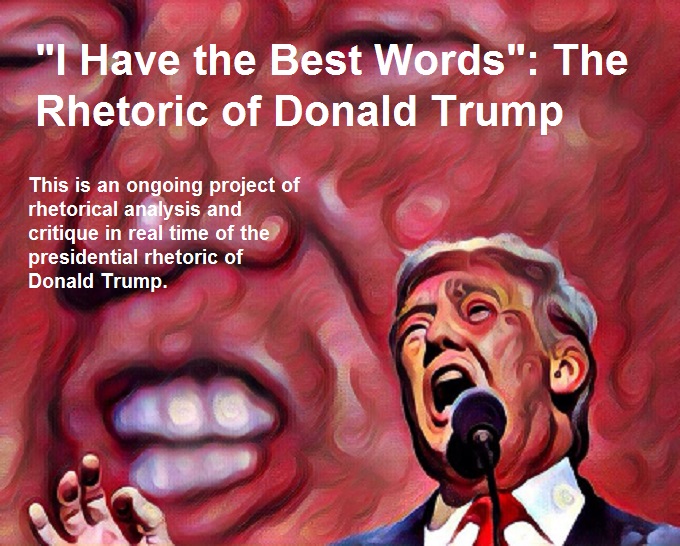Tuesday, November 29, 2016
The Funeral Oration of Trumpicles
So, as we wait for anything resembling a presidential address from Trump, we might begin thinking about the most telling features of Trump rhetoric by imaginatively placing him in well known rhetorical situations of the past. It has some humorous potential, but, as I'll suggest in future posts, I think there's some insight to be gained from what seems like just silliness.
In that spirit, we have the Funeral Oration of Pericles, as delivered in alternative universe by Trump. (If you want to look at the original, one translation can be found here).
Monday, November 21, 2016
"I Have the Best Words": A Statement of Purpose
A few initial words about what goes on here . . .
Rarely does a rhetorical scholar have the opportunity to know in advance that public discourse will be of momentous importance. Rhetorical analysis and criticism usually look at public address that, in retrospect, had a discernible impact on the social sphere. The questions are then a matter of what this impact was, how it was made, was the impact what the speaker intended, etc.
True, there are some rhetorical situations that one can bank on being potentially relevant in advance. This is particularly true of presidential rhetoric, which often takes the form of "set pieces" taking place at predetermined moments: convention acceptance speeches, inaugural addresses, addresses to Congress, etc. Even when such addresses fail to achieve lasting effects, they are worthy of comment simply by virtue of having failed in circumstances in which others have made history.
However, granting that any bit of presidential rhetoric might be said to be, by definition, important, the fact is one never knows whether one is going to get a moment such as Kennedy's inaugural address (about which entire books have been written) or something utterly forgettable (such as Carter's inaugural address 16 year later).
In short, even with presidential address, what rhetorical acts will be worthy of analysis due to the way they shape the nature of political discourse and the presidency itself is rarely clear except when looking in the rear-view mirror.
Rarely does a rhetorical scholar have the opportunity to know in advance that public discourse will be of momentous importance. Rhetorical analysis and criticism usually look at public address that, in retrospect, had a discernible impact on the social sphere. The questions are then a matter of what this impact was, how it was made, was the impact what the speaker intended, etc.
True, there are some rhetorical situations that one can bank on being potentially relevant in advance. This is particularly true of presidential rhetoric, which often takes the form of "set pieces" taking place at predetermined moments: convention acceptance speeches, inaugural addresses, addresses to Congress, etc. Even when such addresses fail to achieve lasting effects, they are worthy of comment simply by virtue of having failed in circumstances in which others have made history.
However, granting that any bit of presidential rhetoric might be said to be, by definition, important, the fact is one never knows whether one is going to get a moment such as Kennedy's inaugural address (about which entire books have been written) or something utterly forgettable (such as Carter's inaugural address 16 year later).
In short, even with presidential address, what rhetorical acts will be worthy of analysis due to the way they shape the nature of political discourse and the presidency itself is rarely clear except when looking in the rear-view mirror.
Subscribe to:
Posts (Atom)

